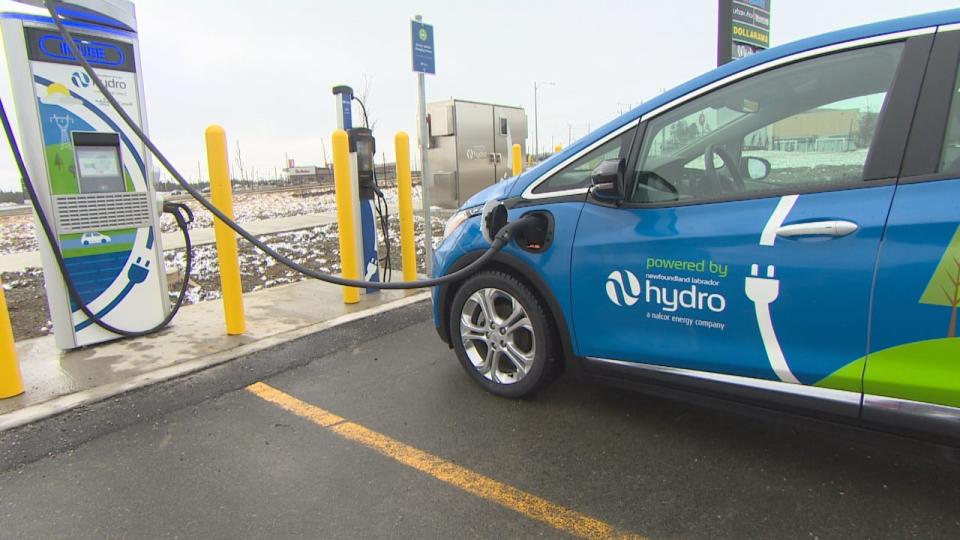More than 500 new electric vehicles hit N.L. roads in 2023

The number of electric vehicles on Newfoundland and Labrador's roads continues to rise, with the total number of EVs in the province rising by nearly three-quarters in 2023.
Updated numbers from the provincial government show that 526 new electric vehicles were registered in 2023, raising the total number to 1,241 — a 74 per cent increase from the previous calendar year.
Those numbers show continued significant growth in the number of electric vehicles in the province. In 2022, 398 new EVs were registered, more than doubling the total number at that time.
The number of hybrid vehicles is also on the rise, up 26 per cent from the year before. Hybrids are vehicles that use two different forms of power, like an internal combustion engine and an electric motor.
Government numbers show there are now 2,722 hybrid vehicles registered in the province.
'It's going to be something that you see everywhere'
Jon Seary, a co-founder of non-profit Drive Electric N.L., says he's encouraged by the growth of electric vehicles.
"This is excellent to see, all the trends are going the way that we expected that they would," he said.
"It mimics any other technology adoption that we've seen.… More and more dealers are having cars available on the lots in stock and ready to buy, and before you know it, it's going to be something that you'll see everywhere."
Seary said the availability and pricing of vehicles depends on the manufacturer. Some have plenty available, while others have long waiting lists for specific models or only choose to carry more costly vehicles with extra bells and whistles.
"Right now, if you want to drive an electric car, there are models to be had in a reasonable amount of time, [but] you may not be able to stay with the brand that you've always wanted to be with," he said.

Jon Seary, a co-founder of Drive Electric N.L., says electric vehicles will only become more and more common on the province's roads. (Kyle Mooney/Radio-Canada)
Seary anticipates the number of EVs to continue to grow as they become more available and more affordable, and he's not alone.
The province lags behind other parts of the country when it comes to EV adoption, but Newfoundland Power expects that between 100,000 and 200,000 EVs will be on the province's roads by 2040. That creates increasing demand amid concerns about the supply of electricity.
In a statement to CBC News, Newfoundland and Labrador Hydro says it's "actively monitoring the rapidly evolving electricity system needs arising from electrification," as last year saw record use of the utility's 23 public fast-charging sites.
"2023 saw record usage at these charging stations with over 13,000 sessions providing almost 330 MWh of energy, which is enough electricity for an average EV to drive more than 1.6 million kilometres," the statement read.
"Most EV owners charge at home, and therefore public charging is estimated to only represent approximately 10 per cent of energy used by EVs in the province."

N.L. Hydro says there was record usage of its EV charging stations in 2023, like this one in Galway, St. John's. (Mark Quinn/CBC)
Seary doesn't expect supply to be an issue.
"You have the ability to choose when your charging happens very easily, and moving that charging window to a time when the demand on the power sources are lower, such as the overnight time, is really easy to do," he said.
Newfoundland Power is also now undertaking a pilot project to make sure the increased demand from electric vehicles can be met while preventing any additional costs.
But Seary said for most new EV owners that he's spoken with, there's an appeal to saving money by not having to pay for gasoline, while reducing their carbon footprint.
"The other thing that's come to me from a lot of new electric vehicle owners is just, they don't want to be contributing to climate change, they don't want to be burning fossil fuels," he said.
"They aren't necessarily tree-hugging, anti-this, that and the other out there, they just simply didn't feel that that was a responsible way to conduct themselves in society, to drive around with something that was constantly polluting."
Download our free CBC News app to sign up for push alerts for CBC Newfoundland and Labrador. Click here to visit our landing page.


